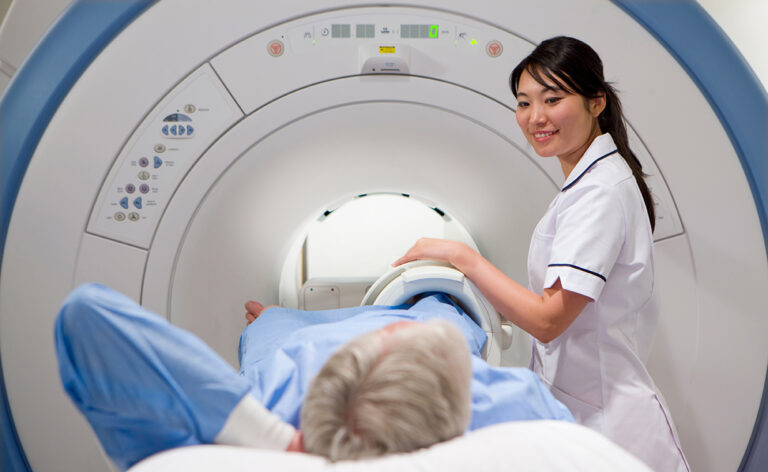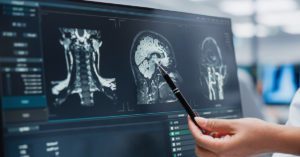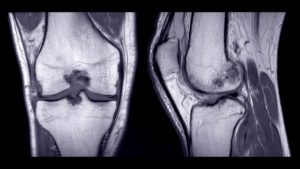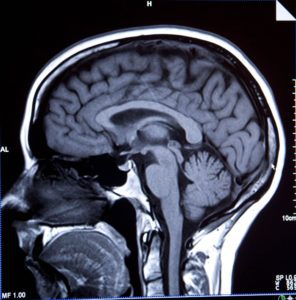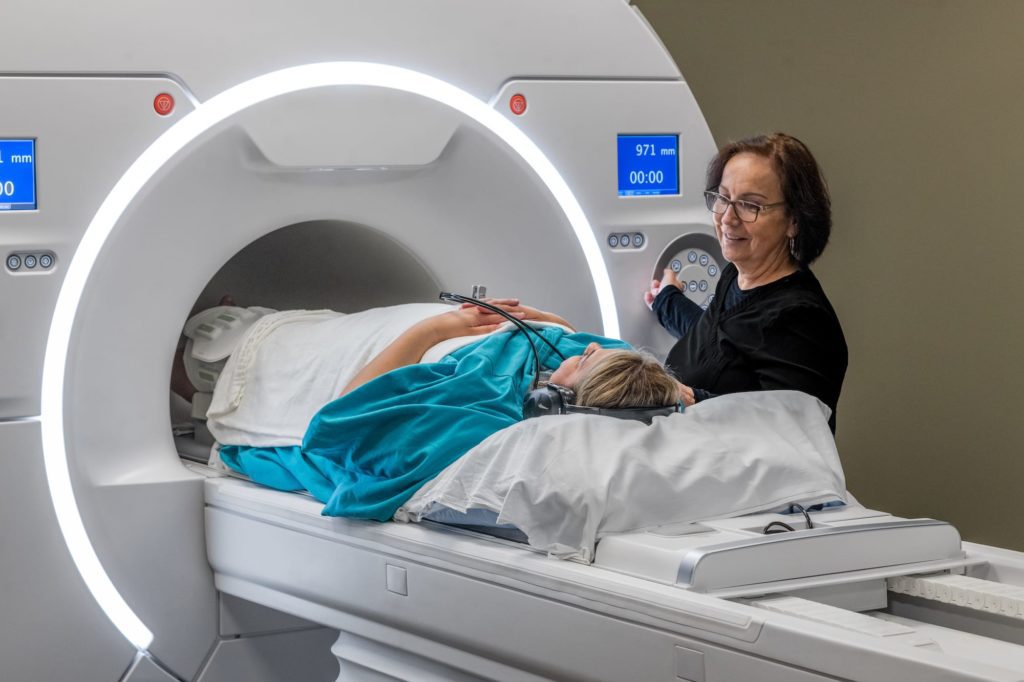MRI scans are painless and noninvasive. In some cases, your doctor may request imaging with a contrast dye to make various structures within the body easier to see in the final MRI images.
To position you for the scan, your Touchstone Medical Imaging technologist will ask you to lie on a table that will slide into a cylinder-shaped tube surrounded by a powerful, circular magnet. The length of this imaging test varies, depending on the area of the body being scanned, whether contrast is used and the type of MRI machine. MRI scans usually take between 15 and 30 minutes, although some imaging studies may take longer.
You will be able to leave the imaging center and continue with your daily routine after the scan. Board-certified radiologists will interpret the results of the MRI and report the findings to your doctor.
Learn more about what you can expect during your MRI with our step-by-step guide.
Pay careful attention to any guidelines your doctor or the staff at Touchstone Medical Imaging provides, including specific details about whether you can eat and drink in the hours prior to an MRI.
Wear comfortable, loose clothing that doesn’t contain metal snaps, buttons or zippers.
Leave jewelry and other metal accessories at home—and remove other items that may contain metal, including hearing aids, dentures and glasses, before the scan begins. Tell your Touchstone Medical Imaging technologist about any metal implants or devices in your body.
MRI scans are safe and do not expose you to radiation. However, the MRI machine emits a powerful magnetic field, so anyone with an implant—such as a pacemaker, a vagus nerve stimulator, an insulin pump, a cochlear implant, or a deep brain stimulator—should speak with their doctor before undergoing an MRI. In some cases, these implanted devices are incompatible with an MRI, and another imaging scan may be a better option.
Your technologist will encourage you to remain as still as possible during the scan. This will contribute to the clarity of the images.
An MRI emits a beeping, clicking or “knocking” noise. We provide you with noise-softening headphones, and we’ll play the music of your choice to help you feel comfortable during the scan.
Patients prone to claustrophobia may be concerned that an MRI scan will be uncomfortable. Touchstone Medical Imaging offers an open MRI, which has an open design with a magnet on top and bottom and open access on the sides, back and front. In addition, Touchstone Medical Imaging offers a Wide Bore MRI that allows for “feet first” scanning while your head remains outside the machine during most limb or body scans. The Wide Bore MRI is spacious and provides 12 inches of space from the face during MRI scans involving the head and neck. A Wide Bore MRI has a more powerful magnet than an Open MRI offering more accurate results with a shorter scan time.
Your medical provider is likely ordering an MRI, in addition to other diagnostic tests, to help rule out a suspected condition, take a closer look at something that an x-ray or ultrasound detected, or to follow-up to ensure your current treatment plan is effective. Typically, an MRI is performed when an x-ray or other medical imaging procedures were either normal or showed something but could not provide the detail of the soft tissues that an MRI offers. Your doctor will discuss the specific reasons with you.
Generally speaking, no, an MRI is not dangerous. Because it uses a large magnetic field to produce images, there is no radiation exposure. There are potential dangers for people with a pacemaker, cochlear implants, and other metal implants, however, there are special MRI machines that can be used for metal implants. Your MRI technician will complete a thorough questionnaire prior to your exam to make sure that you are safe.
For the most part, no. You may be asked to change into a hospital gown for the procedure and remove your jewelry, but as far as hygiene, grooming, eating, and medications, you should not have to deviate from your normal routine.
Yes! The technology of medical imaging and MRI has advanced significantly in the last decade. There are now all sorts of different MRI machines that can accommodate various needs including patient size and physical limitations. Touchstone Imaging offers wide bore MRI machines that provide up to 12 inches of room (depending on your size) and open MRIs to accommodate larger or claustrophobic patients.
There are also varying Tesla ratings in different machines. Bore MRIs (with a circular opening) feature higher strengths at 1.5T and 3.0T for crisp, clear images to diagnose your condition.
Each machine can perform a variety of imaging procedures. For example, a breast MRI looks specifically at breast tissue to help detect lumps. MRA is an MRI that looks specifically at blood vessels. And, the latest innovation in Alzheimer’s treatment is the NeuroQuant imaging software.
The length of your MRI depends on what type of imaging study is being done. Generally, the actual testing time is between 20 and 60 minutes. You may be at your appointment longer with prep time or if you are having multiple studies done. When you schedule your appointment, ask your scheduler for a more accurate timeline.
Once your MRI is completed, our radiologists will interpret the images and create a diagnostic report for your medical provider. Your physician’s office will typically receive the diagnostic report within a few days of your scan.
Yes! Your medical records are your property. Touchstone Medical Imaging provides access to your radiology reports using an AI technology that provides patient friendly definitions and medical diagrams to explain medical terminology. We recommend reviewing your report, making notes on questions, and speaking with your doctor about your questions and next steps for treatment.
No, the MRI is non-invasive and painless.
There are no known consequences on performing an MRI during pregnancy. Medical imaging, aside from ultrasound, is typically avoided during pregnancy. However, we do perform MRI on pregnant women when medically necessary and prescribed by their physician.
Breastfeeding is perfectly safe, however, if you have an MRI with contrast, you should wait 24-48 hours after contrast injection to breastfeed.
It depends. Set metal may not pose a problem and is likely MRI-rated to a certain Tesla (0.5T- 3.0T). If the artificial joint or rod has been implanted for longer than six months, it typically does not pose a problem, but your radiology technician will provide more information about your specific case. Metal in the body can skew MRI images, but this varies depending on the type of metal. Titanium affects MRI images very little, while stainless steel and alloy can cause shadowing on the final images.
The cost of an MRI can be different based on where you are, including your state or city. The type of MRI you need and whether you have insurance also affect the cost. Lastly, cost also depends on where you go to get the MRI. Hospital based MRI scans are more expense than Touchstone’s outpatient imaging centers, which cost up to 60% less than hospital based imaging.
If you have insurance, it may cover some or most of the cost. However, you might still owe an out-of-pocket or deductible cost at the time of your scan. We are in-network with 99% of major insurance plans. Touchstone Imaging will provide an estimate for the amount you will owe based on your insurance coverage at the time of your appointment. You can also talk to your insurance company to understand what they will cover.
Touchstone Medical Imaging requires a referral from a qualified healthcare provider, such as a primary care doctor or a specialist, before scheduling an MRI. Here are a few reasons for a referral:
1. Medical Necessity: Doctors typically order diagnostic tests like MRIs based on medical necessity. They assess your symptoms, medical history, and other factors to determine if an MRI is needed.
2. Interpretation of Results: Doctors are trained to interpret and analyze the results of imaging tests and their reports. Ordering an MRI without proper evaluation by a healthcare professional may lead to misinterpretation or misunderstanding of the results.
3. Insurance Requirements: Health insurance plans often require a doctor’s order for coverage of diagnostic tests. Without a referral, you may face challenges in getting the cost covered by insurance.
If you have specific symptoms or concerns that you believe warrant an MRI, it’s best to consult with a healthcare professional who can assess your situation and determine the appropriate course of action. They can provide a referral for an MRI scan.

